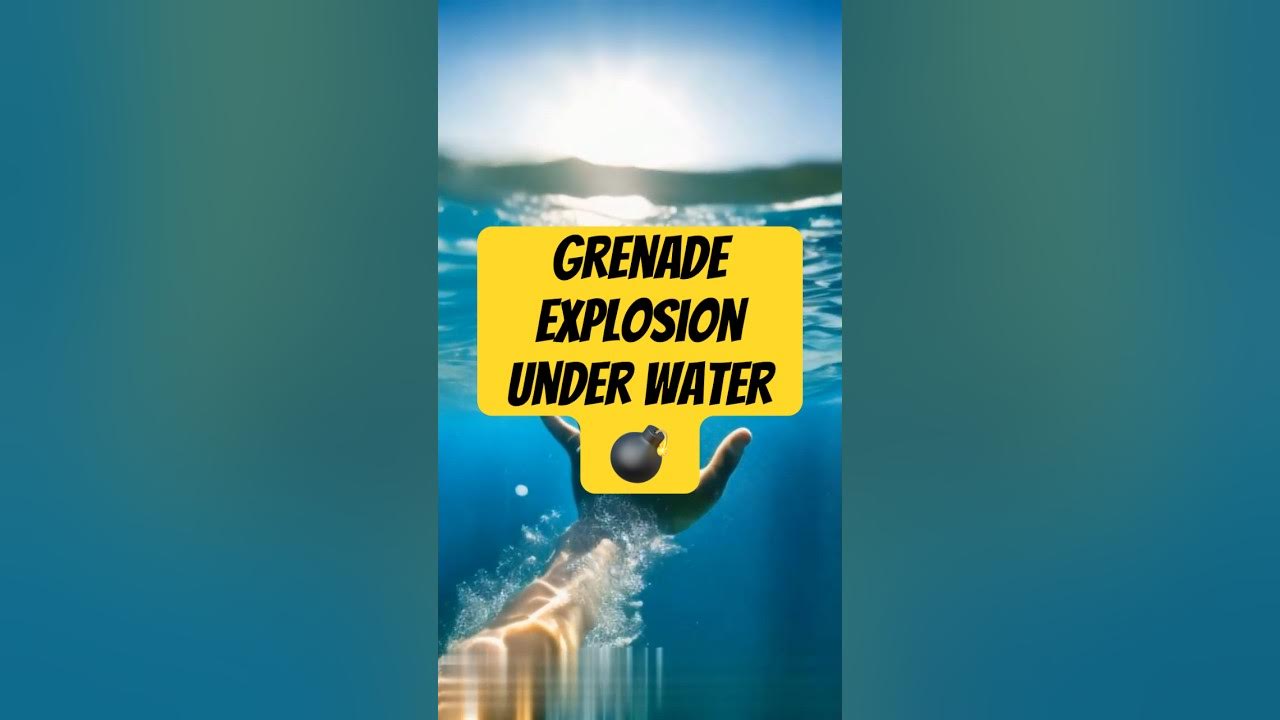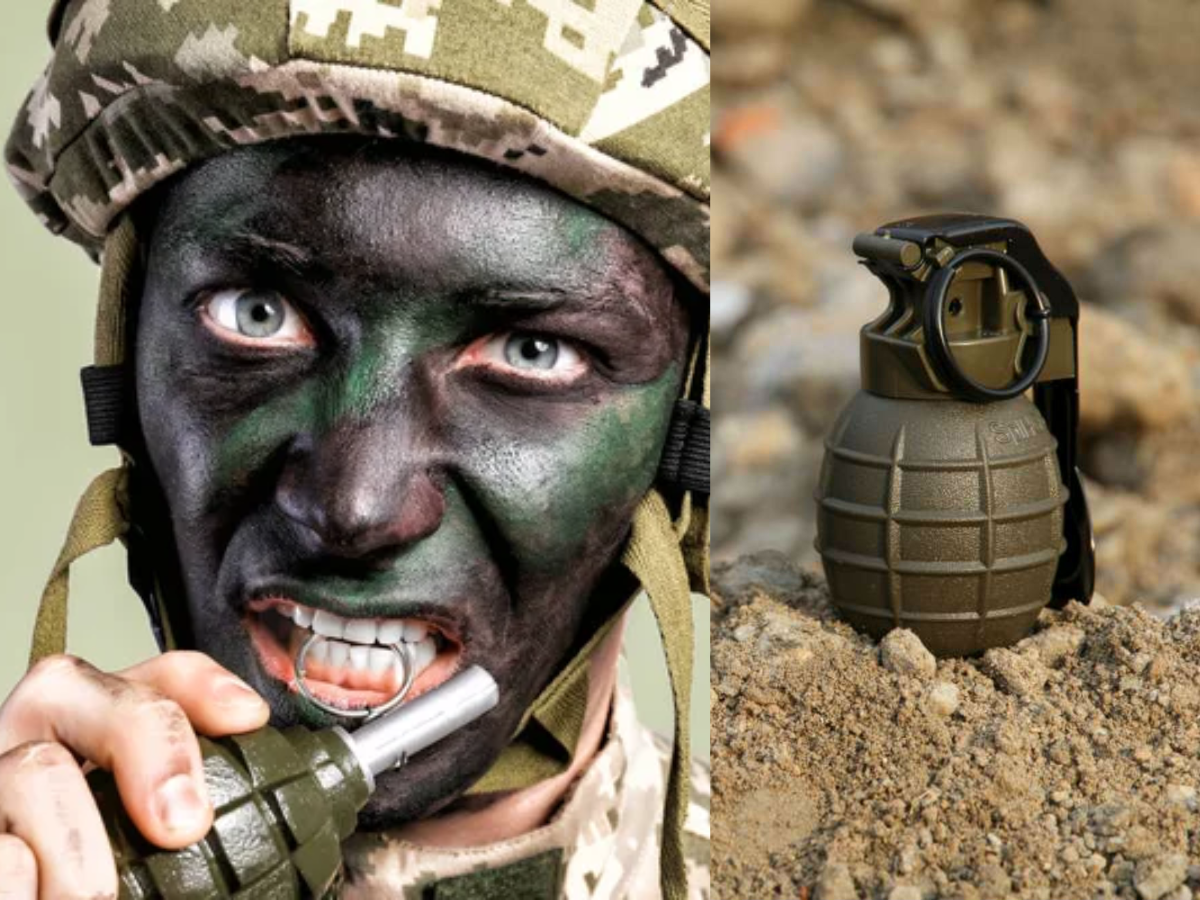Breathtaking Info About What Happens If A Grenade Explodes Underwater

Group Grenade Toss
Underwater Explosions
1. The Initial Blast Wave
Ever wondered what would happen if a grenade went off underwater? It's not exactly a scenario you'd want to experience firsthand, but let's dive in (pun intended!) and explore the science behind it. Imagine tossing a grenade into a lake. What happens next is a rapid chain of events governed by the laws of physics.
First off, you have the explosion itself. When a grenade detonates, it releases a massive amount of energy in a very short time. This energy creates a rapidly expanding bubble of hot gas. Now, air and water are very different mediums. Air is compressible, meaning its volume can be easily reduced under pressure. Water, on the other hand, is much less compressible. This difference in compressibility is key to understanding what happens underwater.
The sudden expansion of gas pushes against the surrounding water, creating a powerful shockwave. This shockwave is a pressure disturbance that travels outward at supersonic speeds, much faster than the speed of sound in air. This initial shockwave is the primary cause of damage near the explosion. Think of it like a super-powered ripple effect, but instead of gently rocking boats, it's capable of crushing things.
Because water is dense, it is an efficient medium for transmitting these shockwaves. Therefore, the shockwave generated by an underwater explosion is usually much more powerful and travels farther than the shockwave generated by a similar explosion in the air. It is also important to note that the shockwave is not the only damaging effect.
2. The Bubble Effect
Okay, so the initial shockwave has passed. But the show's not over yet! After the initial blast, the rapidly expanding gas bubble reaches a maximum size. However, it doesn't just stay there. Inertia causes the bubble to overshoot its equilibrium size, meaning it expands beyond the point where the internal pressure equals the external water pressure.
Once the bubble reaches its maximum size, it begins to collapse inward. This collapse is driven by the immense pressure of the surrounding water. The bubble implodes violently, compressing the remaining gas and creating another, albeit weaker, shockwave. This process of expansion and collapse can repeat several times, creating a series of pulsating bubbles and shockwaves.
These secondary shockwaves are less intense than the initial one, but they can still cause significant damage, especially to objects that are already weakened or resonating at the bubble's frequency. This pulsating effect is like a series of aftershocks, each one contributing to the overall destructive force of the explosion.
The number of pulsations and the intensity of each subsequent shockwave depend on factors such as the depth of the explosion and the size of the initial explosive charge. Shallower explosions tend to have more pronounced pulsations, while deeper explosions may have fewer, but more intense, pulses.
3. Damage and Destruction
So, who or what is likely to suffer the consequences of an underwater grenade explosion? The answer, unfortunately, is quite a lot. The initial shockwave can cause immediate and severe damage to anything in its path. Fish, marine mammals, and even humans can suffer from ruptured organs, broken bones, and concussions. The closer you are to the explosion, the more severe the damage.
Structures like submarines, ships, and underwater pipelines are also vulnerable. The shockwave can create cracks, dents, and even complete structural failure, depending on the strength of the explosion and the design of the structure. The pulsating bubble effect can further exacerbate the damage, weakening already stressed areas.
Even relatively small explosions can have a significant impact on marine ecosystems. The sudden pressure changes can kill plankton and other small organisms, disrupting the food chain. The noise from the explosion can also disorient and stress marine animals, interfering with their ability to communicate, navigate, and find food. It is a bad day to be any living thing that is in the nearby vacinity.
The long-term effects of underwater explosions can be even more insidious. Repeated exposure to these events can lead to chronic stress, hearing loss, and other health problems in marine animals. The cumulative damage to marine habitats can also have cascading effects on the entire ecosystem, leading to declines in fish populations and other important species. This will alter the ecosystem completely.
4. Depth Matters
5. The Deeper Dive of Underwater Grenades
Where the grenade goes off makes a huge difference. A shallow explosion is like slapping the water really hard — the energy dissipates more quickly. This can create a more dramatic surface display with a larger plume of water. However, the shockwave might not travel as far or be as focused as a deeper blast.
A deeper explosion, on the other hand, is more like a focused punch. The water pressure helps to contain the energy and direct the shockwave outwards. This means the shockwave can travel farther and be more powerful at a distance. Think of it like comparing a wide, shallow puddle to a deep, narrow well. The well can hold and direct more water pressure.
The depth also affects the bubble pulsation we talked about earlier. In shallower water, the bubble might break the surface, releasing some of the energy into the air. In deeper water, the bubble is more contained, leading to stronger and more numerous pulsations. So, the location really dictates how the energy spreads and what the resulting damage looks like.
In addition, the depth of the water column and the surrounding geographical features can affect the reverberation of the shock wave. In a shallow environment, the shock wave will reverberate to the surface of the water much quicker than at a deep sea location. The shock waves and pulsations can also be amplified in enclosed spaces, such as caves or tunnels.
6. Grenades vs. Other Explosives
A grenade is a relatively small explosive device, but it can still pack a punch, especially underwater. However, comparing it to larger explosives like depth charges or torpedoes really puts things into perspective. Depth charges, designed specifically for underwater warfare, contain significantly more explosive material. Their shockwaves can be devastating to submarines and other underwater vessels.
Torpedoes, even more so, are self-propelled explosives that deliver a concentrated blast directly to their target. The energy released by a torpedo explosion is orders of magnitude greater than that of a grenade. While a grenade might damage a small boat or incapacitate someone nearby, a torpedo can sink a large ship. It's all about the scale of the explosion and the intended target.
The type of explosive also matters. Some explosives are designed to create a more powerful shockwave, while others are designed to produce a more sustained burning effect. Underwater, the shockwave is usually the primary concern, as it's the most effective way to transmit energy through the water. However, the burning effect can still cause localized damage, particularly in enclosed spaces.
So, while a grenade explosion underwater is certainly something to be avoided, it's important to remember that it's just one point on a spectrum of underwater explosives. Understanding the differences in size, strength, and explosive type can help us better assess the potential risks and impacts of these events. In the event of the explosion, be sure to immediately seek safety.

What Is A Rapid Unscheduled Disassembly? The New York Times
FAQ
7. Frequently Asked Questions about Underwater Grenade Explosions
What is the safe distance from an underwater grenade explosion?
Honestly, there's no truly "safe" distance, but the further away you are, the better your chances. The immediate vicinity (within a few meters) is almost certainly lethal. Beyond that, the severity of injuries decreases with distance. It depends on the size of the grenade, but hundreds of meters is much safer than tens of meters.
Can an underwater explosion cause a tsunami?
Unlikely with a grenade. Grenades simply don't have enough explosive power to generate a tsunami. Tsunamis are typically caused by large-scale geological events like earthquakes or underwater landslides. However, a very large underwater explosion (think a massive naval mine) could theoretically generate a small, localized wave, but it wouldn't be a true tsunami.
Are there any practical uses for underwater explosions?
Aside from warfare (which isn't exactly "practical" in a positive sense), controlled underwater explosions are sometimes used for demolition purposes, like removing underwater structures or clearing shipping lanes. However, these applications are carefully planned and executed to minimize environmental damage. Also, scientists use small underwater explosions to study the properties of the ocean floor.
How do I protect myself from an underwater explosion?
If you're in a situation where there's a risk of underwater explosions, the best thing to do is to get as far away as possible, as quickly as possible. Seek shelter behind a solid object or inside a structure if possible. If you're in the water, try to get to the surface and create as much distance as possible between yourself and the potential source of the explosion. Be aware of your surroundings and any potential threats. Most importantly, avoid areas where underwater explosions are likely to occur.

What Happens If You Throw A Grenade In Fire Armory Daily

Can You Survive A Grenade Explosion Underwater? YouTube

It Happens When The Biggest Underwater Volcano Explodes! YouTube
)